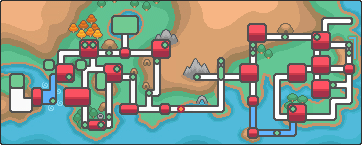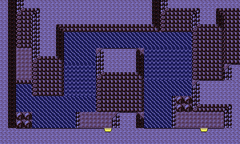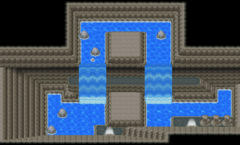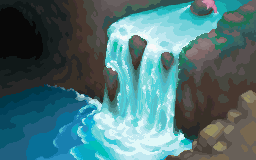From Bulbapedia, the community-driven Pokémon encyclopedia.
|
|
| Line 195: |
Line 195: |
|
| |
|
| ===Name origin=== | | ===Name origin=== |
| The Japanese name トージョウ shows that the location of the falls is a boundary between the two [[region]]s: at the end of カン'''トー''' and the beginning of '''ジョウ'''ト. This naming convention is popular in Japan, as in 京葉(Keiyō; named for 東'''京''' and 千'''葉''') and 東名(Tōmei; named for '''東'''京 and '''名'''古屋). Its English name can also be taken as an anagram of ''Johto''. Its Korean name is a portmanteau of 관'''동''' ''Gwan'''dong''''' (Kan'''to''') and '''성'''도 '''''Seong'''do'' ('''Joh'''to), while its Chinese name is both an inversion of 城都 ''Chéngdū'' (Johto) and a portmanteau of 關'''都''' ''Guān'''dū''''' (Kan'''to''') and '''城'''都 '''''Chéng'''dū''. | | The Japanese name トージョウ shows that the location of the falls is a boundary between the two [[region]]s: at the end of カン'''トー''' and the beginning of '''ジョウ'''ト. This naming convention is popular in Japan, as in 京葉 (Keiyō; named for 東'''京''' and 千'''葉''') and 東名 (Tōmei; named for '''東'''京 and '''名'''古屋). Its English name can also be taken as an anagram of ''Johto''. Its Korean name is a portmanteau of 관'''동''' ''Gwan'''dong''''' (Kan'''to''') and '''성'''도 '''''Seong'''do'' ('''Joh'''to), while its Chinese name is both an inversion of 城都 ''Chéngdū'' (Johto) and a portmanteau of 關'''都''' ''Guān'''dū''''' (Kan'''to''') and '''城'''都 '''''Chéng'''dū''. |
|
| |
|
| ==In other languages== | | ==In other languages== |
Revision as of 23:17, 12 October 2017
| Tohjo Falls
|
|
トージョウのたき
Tōjō Falls
|
| "Wild Missingno. appeared!"
|
|
|
|
| Map description:
|
The Tohjo waterfall that links the Kanto and Johto regions.
|
| Location:
|
Route 27
|
| Region:
|
Kanto
|
| Generations:
|
II, IV
|

Location of Tohjo Falls in Kanto.
|
| Pokémon world locations
|
The Tohjo Falls (Japanese: トージョウのたき Tōjō Falls) are two waterfalls separating the Johto and Kanto regions, and known as The Link Between Kanto and Johto.
In the games
Located in southwest Kanto, it is the final test for Trainers who have acquired all eight Johto League Badges and wish to put their skills to the test against the Elite Four on Indigo Plateau to the north. The player will need his/her Pokémon to use the moves Surf and Waterfall to get through it. Because Trainers must obtain all the eight Johto League Badges to be granted access to the Pokémon League, the falls effectively hinder any progress on Route 27 until after the Trainer has HM07 (Waterfall) and has obtained the Rising Badge from Clair at Blackthorn Gym.
In Pokémon HeartGold and SoulSilver, there is a cave hidden behind the waterfall. Normally, if the player enters the cave, they will find an empty cave with a broken radio. If the player takes a promotional event Celebi as the walking Pokémon to the Ilex Forest shrine, Celebi will take the player back in time, allowing them to battle Giovanni here. Outside the event, this cave is otherwise useful for collecting items found via Rock Smash without any concern of a wild Pokémon encounter.
In Pokémon HeartGold and SoulSilver, after entering the Hall of Fame for the first time and boarding the S.S. Aqua, the battle music in the Tohjo Falls (as well as in Victory Road, Routes 26, 27, and 28) changes from the Johto style to the Kanto style. This change was not present in the original Pokémon Gold and Silver nor in Pokémon Crystal.
Items
Rock Smash
Pokémon
Generation II
| Pokémon
|
Games
|
Location
|
Levels
|
Rate
|
|
|
G
|
S
|
C
|
|
22
|
30%
|
|
|
G
|
S
|
C
|
|
22
|
30%
|
|
|
G
|
S
|
C
|
|
24
|
20%
|
|
|
G
|
S
|
C
|
|
21-23
|
15%
|
|
|
G
|
S
|
C
|
|
20
|
5%
|
| Surfing
|
|
|
G
|
S
|
C
|
|
20-24
|
60%
|
|
|
G
|
S
|
C
|
|
20-24
|
30%
|
|
|
G
|
S
|
C
|
|
20-24
|
10%
|
| Fishing
|
|
|
G
|
S
|
C
|
|
10
|
15%
|
|
|
G
|
S
|
C
|
|
10
|
85%
|
|
|
G
|
S
|
C
|
|
20
|
65%
|
|
|
G
|
S
|
C
|
|
20
|
35%
|
|
|
G
|
S
|
C
|
|
40
|
70%
|
|
|
G
|
S
|
C
|
|
40
|
10%
|
|
|
G
|
S
|
C
|
|
40
|
20%
|
| A colored background means that the Pokémon can be found in this location in the specified game. A white background with a colored letter means that the Pokémon cannot be found here.
|
Generation IV
| Pokémon
|
Games
|
Location
|
Levels
|
Rate
|
|
|
HG
|
SS
|
|
22
|
30%
|
|
|
HG
|
SS
|
|
22
|
30%
|
|
|
HG
|
SS
|
|
22
|
20%
|
|
|
HG
|
SS
|
|
20-23
|
15%
|
|
|
HG
|
SS
|
|
20
|
5%
|
| Surfing
|
|
|
HG
|
SS
|
|
20
|
60%
|
|
|
HG
|
SS
|
|
20
|
30%
|
|
|
HG
|
SS
|
|
20
|
10%
|
| Fishing
|
|
|
HG
|
SS
|
|
10
|
95%
|
|
|
HG
|
SS
|
|
10
|
5%
|
|
|
HG
|
SS
|
|
20
|
60%
|
|
|
HG
|
SS
|
|
20
|
40%
|
|
|
HG
|
SS
|
|
40
|
90%
|
|
|
HG
|
SS
|
|
40
|
7%
|
|
|
HG
|
SS
|
|
40
|
3%
|
| Special Pokémon
|
|
|
HG
|
SS
|
|
22
|
20%
|
|
|
HG
|
SS
|
|
22
|
20%
|
|
|
HG
|
SS
|
|
22
|
20%
|
|
|
HG
|
SS
|
|
22
|
20%
|
| A colored background means that the Pokémon can be found in this location in the specified game. A white background with a colored letter means that the Pokémon cannot be found here.
|
Trainers
Giovanni hides out in the Tohjo Falls, at least part of the time, during the three-year interim between Pokémon FireRed and LeafGreen and Pokémon HeartGold and SoulSilver, and hears Team Rocket's pleas to him from the Goldenrod Radio Tower when they take over. He can be battled during a special event in which a Celebi takes the player back in time; this can be triggered by taking a Celebi to the Ilex Forest Shrine. The battle takes place at the same time that Team Rocket disbands again at the Goldenrod Radio Tower.

|
|
Reward: $8280
|
|
|
|
|
|
Layout
In the anime
Although it is never visited directly, the Battle Tower is referred to as being close to the Tohjo Falls.
In the manga

Tohjo Falls in Pokémon Adventures
In the Pokémon Adventures manga
In Chinchou in Charge, Misty, Brock, and Erika passed through the Tohjo Falls on their way to Johto. While crossing a rope bridge, Misty fell into a waterfall and saved a Krabby that was in trouble. After this, in Lovely Lanturn, Suicune came and challenged her. After battling with Misty, Suicune decided to go with her, and she, Brock and Erika continued their journey.
Origin
The Tohjo Falls seem to be similar to the real-life Niagara Falls, as both have two waterfalls serving as a well-known boundary between two places.
Name origin
The Japanese name トージョウ shows that the location of the falls is a boundary between the two regions: at the end of カントー and the beginning of ジョウト. This naming convention is popular in Japan, as in 京葉 (Keiyō; named for 東京 and 千葉) and 東名 (Tōmei; named for 東京 and 名古屋). Its English name can also be taken as an anagram of Johto. Its Korean name is a portmanteau of 관동 Gwandong (Kanto) and 성도 Seongdo (Johto), while its Chinese name is both an inversion of 城都 Chéngdū (Johto) and a portmanteau of 關都 Guāndū (Kanto) and 城都 Chéngdū.
In other languages














